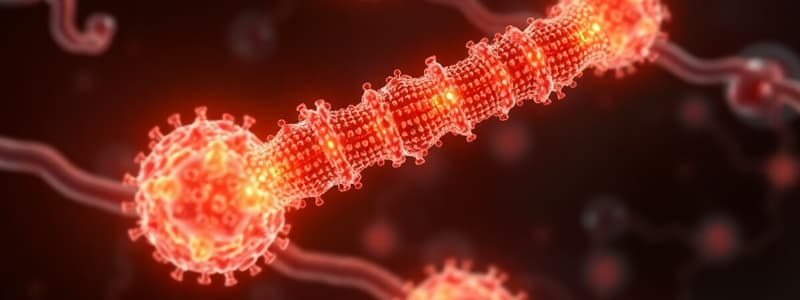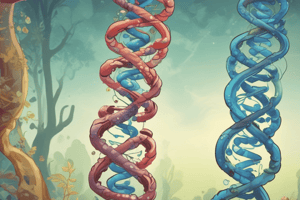Podcast
Questions and Answers
What happens to telomeres in normal cells during cell division?
What happens to telomeres in normal cells during cell division?
- They lengthen with each division.
- They shorten with each division. (correct)
- They eventually cause the cell to become cancerous.
- They remain unchanged throughout cell divisions.
What is the result of disabled checkpoints in a cell with shortened telomeres?
What is the result of disabled checkpoints in a cell with shortened telomeres?
- The cell undergoes apoptosis.
- The cell enters a state of senescence.
- The cell continues to divide normally without any consequences.
- The cell can activate DNA repair pathways inappropriately. (correct)
How do tumor cells achieve limitless replicative potential?
How do tumor cells achieve limitless replicative potential?
- By entering a permanent state of senescence.
- By lengthening the lifespan of their telomeres through telomerase reactivation. (correct)
- By undergoing mitotic catastrophe repeatedly.
- By disabling their DNA repair pathways.
What leads to mitotic crisis in a cell?
What leads to mitotic crisis in a cell?
Which characteristic is NOT true for normal cells?
Which characteristic is NOT true for normal cells?
Flashcards
Telomeres
Telomeres
The protective caps at the ends of chromosomes that shorten with each cell division.
Telomerase
Telomerase
An enzyme that extends telomeres, allowing cells to avoid shortening and continue dividing.
Cellular Senescence
Cellular Senescence
A state where cells stop dividing, triggered by shortened telomeres.
Mitotic Crisis
Mitotic Crisis
Signup and view all the flashcards
How Tumor Cells Achieve Immortality
How Tumor Cells Achieve Immortality
Signup and view all the flashcards
Study Notes
Cell Replication and Telomeres
- Normal cells lack telomerase, an enzyme that maintains telomere length.
- Telomeres, protective caps on chromosomes, shorten with each cell division.
- Shortened telomeres trigger cell cycle checkpoints, leading to cellular senescence (cells stop dividing).
- This limits the number of cell divisions for a normal cell.
Cell Division and Checkpoints
- Cells with disabled checkpoints can have shortened telomeres inappropriately activate DNA repair pathways.
- This results in massive chromosomal instability, entering a state called mitotic crisis, where proper cell division cannot occur.
Tumor Cell Characteristics
- Tumor cells reactivate telomerase to lengthen telomeres.
- Reactivating telomerase helps tumor cells avoid mitotic catastrophe (cell death from faulty cell division).
- This allows tumor cells to divide indefinitely, gaining "immortality."
Studying That Suits You
Use AI to generate personalized quizzes and flashcards to suit your learning preferences.
Description
This quiz explores the mechanisms of cell replication, the role of telomeres, and the characteristics of tumor cells. Learn how telomerase affects cellular senescence and its implications for cancer biology. Test your understanding of cell division checkpoints and chromosomal stability.




